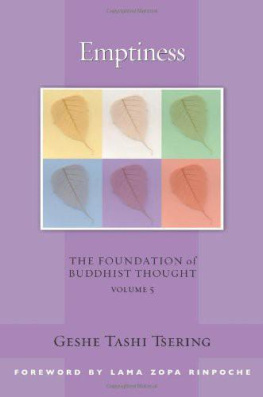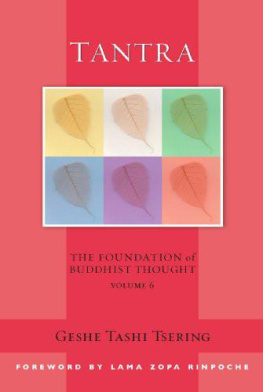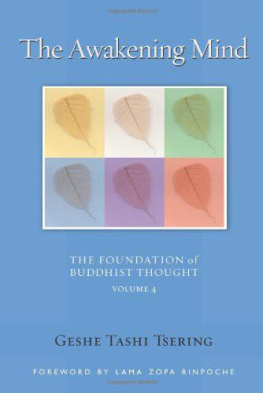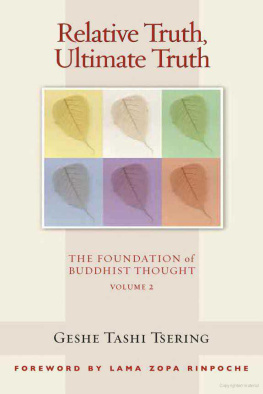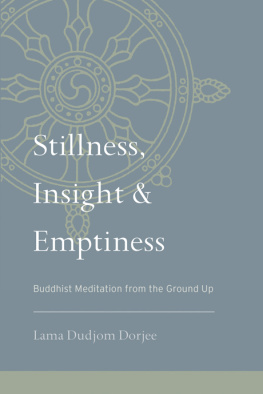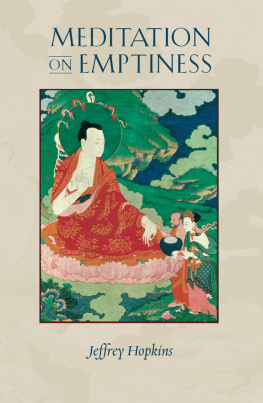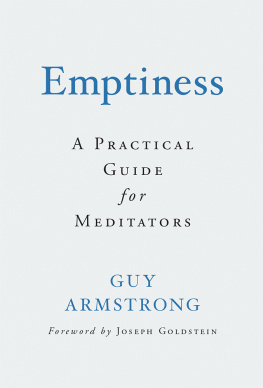Table of Contents
THE FOUNDATION OF BUDDHIST THOUGHT SERIES
1. The Four Noble Truths2. Relative Truth, Ultimate Truth3. Buddhist Psychology4. The Awakening Mind5. Emptiness6. Tantra

FOREWORD
THE BUDDHAS MESSAGE is universal. We all search for happiness but somehow fail to find it because we are looking for it in the wrong way. Only when we start cherishing others will true happiness grow within us. And so the Buddhas essential teaching is one of compassion and ethics, combined with the wisdom that understands the nature of reality. The teachings of the Buddha contain everything needed to eliminate suffering and make life truly meaningful, and as such the teachings are not only relevant to todays world, but vital.
This is the message my precious teacher, Lama Thubten Yeshe, gave to his Western students. His vision to present the Dharma in a way that is accessible and relevant to everyone continues and grows. His organization, the Foundation for the Preservation of the Mahayana Tradition (FPMT), now has centers all over the world, and Lamas work is carried on by many of his students.
The Foundation of Buddhist Thought , developed by Geshe Tashi Tsering, is one of the core courses of the FPMTs integrated education program. The essence of Tibetan Buddhist philosophy can be found within its six subjects. The Foundation of Buddhist Thought serves as a wonderful basis for further study in Buddhism, as well as a tool to transform our everyday lives.
Geshe Tashi has been the resident teacher at Jamyang Buddhist Centre, London, since 1994. He has been very beneficial in guiding the students there and in many other centers where he teaches. Besides his profound knowledgehe is a Lharampa Geshe, the highest educational qualification within our traditionhis excellent English and his deep understanding of his Western students means that he can present the Dharma in a way that is both accessible and relevant. His wisdom, compassion, and humor are combined with a genuine gift as a teacher. You will see within the six books of the Foundation of Buddhist Thought series the same combination of profound understanding and heart advice that can guide beginner and experienced Dharma practitioner alike on the spiritual path.
Whether you read this book out of curiosity or as part of your spiritual journey, I sincerely hope that you find it beneficial and that it shows you a way to open your heart and develop your wisdom.
Lama Zopa Rinpoche
Spiritual Director
The Foundation for the Preservation of the Mahayana Tradition
PREFACE
IN THIS BOOK I have tried to explain how we can cultivate within ourselves the understanding of the ultimate reality of how things and events exist, based on my very limited understanding and experience of emptiness. The book itself offers no comprehensive guide to the most esoteric teachings on emptiness, but is rather aimed at the beginner who wishes to gain some small insight into this subject, a subject that is extremely important for anyone who takes the Buddhist path seriously.
At the very beginning of his teaching career the Buddha introduced the concept of emptiness. The path that leads to the cessation of suffering, the fourth noble truth, is in essence the eightfold noble path, and within this path is right view. Even though we can interpret right view in many different ways, inferring many levels of subtlety, within Mahayana Buddhism it is generally agreed that the most profound level of right view is the understanding of selflessness or emptiness. It is also agreed that, along with compassion, developing an insight into emptiness is vital for someone on the path to enlightenment.
Why is emptiness so crucial? We who are bound to unenlightened existence need to realize it in order to be free. Born of delusion and karma, we are caught up in an endless round of birth, aging, sickness, and death, and we are almost powerless to break this vicious cycle. The root of that process is fundamental ignorance, and we will be forever chained to unenlightened existence until we uproot it. The opposite of this basic mis-reading of our experience is the wisdom that understands the nature of reality at the deepest level. The most fundamental mode of existence of all phenomena in the universe is that they are absent of the intrinsic reality that our ignorance instinctively ascribes to them. And only the wisdom realizing emptiness has the full ability to counteract that ignorance that keeps us trapped in cyclic existence. In this context, understanding emptiness is vital.
In A Guide to the Bodhisattvas Way of Life, the great Indian master Shantideva starts the chapter on wisdom with:
All of these practices were taught
By the Mighty One for the sake of wisdom.
Therefore, those who wish to pacify suffering
Should generate this wisdom.
This verse tells us how crucial it is to develop an understanding of emptiness. Therefore in this book I have tried to use whatever limited knowledge and experience I have of the subject to explain how to gain this perfection of wisdom.
This book is a companion to the second book of the Foundation of Buddhist Thought series, Relative Truth, Ultimate Truth. The two truths are those of conventional and ultimate reality, and although I talked about both, in that book I focused more on relative, conventional reality. I deliberately saved the discussion of ultimate truth for this book.
Emptiness also links with the fourth book of the series, The Awakening Mind. The awakening mind is bodhichitta, the mind that seeks enlightenment in order to free all beings. It is a mind that is filled with great compassion, and because of that, sees that we need enlightenment to best serve others. That needs a full realization of emptiness.
As the great Indian master Chandrakirti says, to achieve enlightenment we need the two wings of method and wisdom, like the two wings of a bird. The Awakening Mind deals with how to develop love, compassion, bodhichitta, and other vital minds such as patience, ethics, and so onthe method side of the practice. This book deals with the other wing, the wisdom of emptiness. Just as a bird cant fly with only one wing, likewise, we who seek to awaken need both method and wisdom.
I feel quite embarrassed. So many great teachers have taught extensively on emptiness; so many great texts have been written about it. We have over two thousand years of wisdom showing us how to develop this most crucial mind, and I, with so little knowledge, am adding yet another book on the subject. And yet, somehow I feel this book might be beneficial. I feel there is a gap between the extremely simplistic explanations of emptiness that are available, and the extensive, profound, and difficult to comprehend texts of the great masters. I hope this book will help to fill that gap. My motivation is sincere, and I genuinely hope that what I have written here can help those of you who, like me, are at the beginning of your quest for some higher understanding of the nature of this universe we live in. I further hope that, from this beginning, you may continue and study the great texts, meditate on this most profound of all subjects, and in the future come to have some actual realization of emptiness. If that can happen, then this book has been very worthwhile.
EDITORS PREFACE
EMPTINESS, selflessness, voidness, shunyatathere are many terms used when discussing the wisdom side of the Buddhas teaching. It is so subtle that its all too easy to get lost in the esoteric arguments and forget just how relevant this subject is to us, especially in this time of crisis. Geshe Tashi is not using hyperbole when he says that the Buddha was being truly revolutionary when he proposed that phenomena had no self.
Next page
